In Morrow, plumbing emergencies like burst pipes and overflowing toilets can cause significant damage. Flood Medics responds quickly to such issues, ensuring you minimize water loss and prevent additional harm. They handle clogged drains, leaky faucets, and water heater failures with proficiency, using effective techniques for fast resolution. With their expertise, you can trust that your plumbing emergencies will be addressed swiftly and efficiently. Uncover more about how they can help you tackle these urgent issues effectively.
Key Takeaways
- Burst pipes require immediate attention; Flood Medics can quickly assess and repair damage to prevent further water loss and destruction.
- Clogged drains are common; Flood Medics uses advanced techniques like hydro jetting to clear blockages efficiently and restore flow.
- Overflowing toilets can cause significant mess; Flood Medics responds promptly to shut off water and resolve the underlying issues.
- Leaky faucets lead to waste and higher bills; Flood Medics can address leaks quickly to prevent escalation and protect your home.
- Water heater failures disrupt daily life; Flood Medics provides fast diagnosis and repair to restore hot water and ensure system longevity.
Burst Pipes: Immediate Action Required
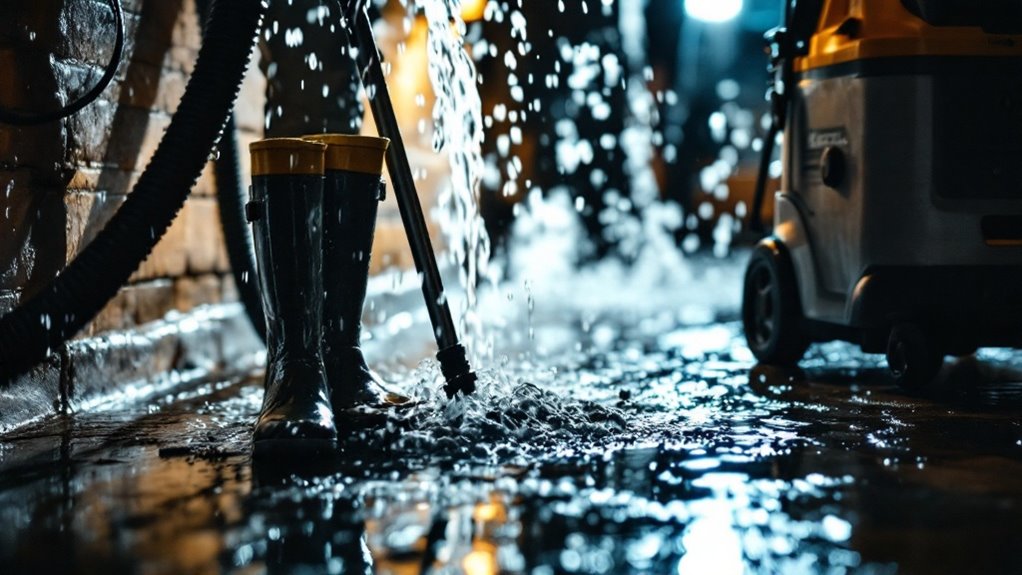
When a pipe bursts, the situation demands your immediate attention to prevent extensive water damage and costly repairs. First, locate your main water shut-off valve and turn it off to stop the flow. Next, assess the area for any visible leaks or damage. If you've got pipe insulation, check its integrity; it may help prevent future incidents. For significant leaks, contact emergency services right away. They have the tools and expertise to manage the situation effectively. In the meantime, use towels or buckets to contain any water. Remember, acting quickly can minimize damage and save you money in the long run. Additionally, calling a 24/7 emergency hotline can ensure that help is on the way promptly. Stay calm and focused, and you'll navigate this plumbing crisis more easily.
Clogged Drains: Causes and Solutions
Clogged drains can disrupt your daily routine, and understanding their common causes is crucial for effective prevention. Hair, grease, and foreign objects often lead to blockages that require immediate attention. By recognizing these issues and employing the right clearing techniques, you can restore your plumbing system's functionality quickly. Additionally, seeking help from 24 Hour Plumbing services ensures that any urgent issues are addressed promptly to minimize damage.
Common Clogging Causes
Numerous factors can contribute to clogged drains, and understanding these common causes is essential for effective prevention and resolution. Regular drain maintenance and plumbing inspections can help you identify these issues before they escalate. Here's a quick overview of the most frequent culprits:
| Cause | Description | Prevention |
|---|---|---|
| Hair and Debris | Accumulates in showers and sinks | Use drain screens |
| Grease and Oil | Buildup from cooking waste | Dispose of properly |
| Foreign Objects | Items accidentally flushed | Educate household members |
Effective Clearing Techniques
While tackling a clogged drain can feel overwhelming, employing effective clearing techniques can save you time and frustration. Here are three methods you can try:
- Drain Snake: This handy tool breaks up and removes stubborn clogs. Insert the snake into the drain, twist it to snag debris, and pull it out.
- Boiling Water: Pouring boiling water down the drain can dissolve grease and soap buildup. Be cautious with plastic pipes, though.
- Hydro Jetting: For severe blockages, hydro jetting uses high-pressure water to clear pipes. This method's effective for removing tough minerals and tree roots.
Overflowing Toilets: How to Handle the Situation
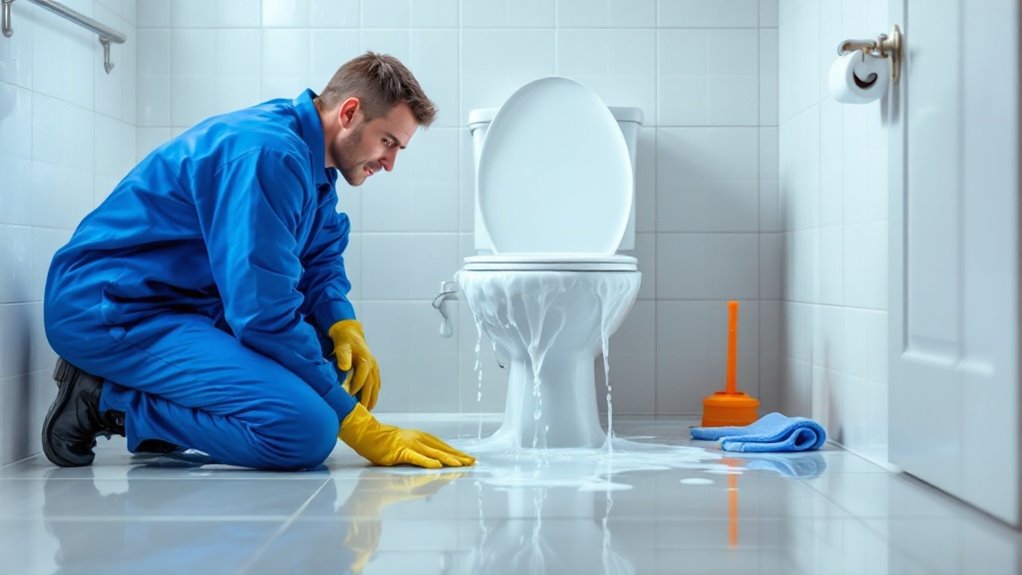
When your toilet overflows, acting quickly is essential to minimize damage. First, shut off the water supply to prevent further spills, then address any visible clogs. To prevent future overflows, consider regular maintenance and avoid flushing inappropriate items.
Immediate Steps to Take
If you find yourself facing an overflowing toilet, it's crucial to act quickly to prevent water damage and maintain hygiene. Here are immediate steps you should take as part of your emergency preparedness:
- Shut off the water supply: Locate the shut-off valve behind the toilet and turn it clockwise to stop the flow.
- Remove excess water: Use towels or a bucket to soak up any overflow, preventing further damage to your bathroom.
- Check for blockages: If the toilet bowl is still filling, try using a plunger for quick fixes to clear any obstructions.
Acting swiftly can save you time and money in the long run. Don't hesitate to call a professional if the situation worsens.
Preventing Future Overflows
To prevent future toilet overflows, regular maintenance and awareness are vital. Implementing overflow prevention strategies can save you from messy situations. Here are some maintenance tips to keep in mind:
| Maintenance Tips | Frequency |
|---|---|
| Check for leaks | Monthly |
| Clean the toilet tank | Quarterly |
| Test the flapper valve | Biannually |
| Inspect the fill valve | Annually |
| Monitor toilet usage | Ongoing |
Leaky Faucets: Why They Matter
Though often dismissed as a minor annoyance, leaky faucets can lead to significant water waste and increased utility bills, making them a crucial plumbing issue. Addressing these leaks promptly is vital for effective faucet maintenance. Here's why you should care:
- Water Waste: Even a slow drip adds up quickly, wasting gallons of water daily.
- Higher Bills: Those wasted gallons show up on your utility bill, costing you money unnecessarily.
- Potential Damage: Persistent leaks can damage fixtures and lead to mold growth, creating further headaches.
Ignoring a leaky faucet isn't just about inconvenience; it's about protecting your home and finances. So, keep an eye out for those drips and tackle them before they escalate into a bigger problem.
Water Heater Failures: Signs to Watch For
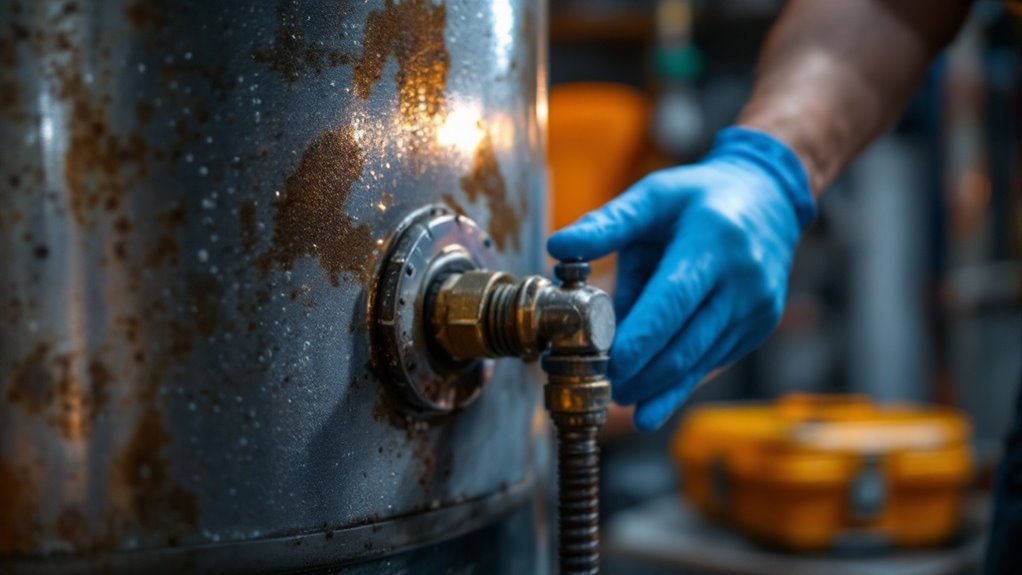
How can you tell if your water heater is on the verge of failure? Watch for signs like fluctuating water pressure, which often indicates sediment buildup or a failing heating element. If you notice rusty or discolored water, that's a clear sign of corrosion within the tank. Unusual noises, such as banging or popping, often suggest sediment accumulation, which affects efficiency. Furthermore, if your hot water runs out quickly or your heater leaks, it's time to act. Regular maintenance tips include flushing your tank annually and checking the pressure relief valve. By staying vigilant, you can catch these issues early, ensuring your water heater runs smoothly and prolonging its lifespan. Don't wait until it's too late!
Sewer Backups: Identifying the Problem
Water heater failures can disrupt your daily routine, but sewer backups pose an even more immediate threat to your home. Recognizing the signs can help you take swift action. Here are three indicators of a sewer backup:
- Unpleasant odors: Foul smells coming from drains signal a potential blockage.
- Slow drains: If multiple fixtures drain slowly, your sewer system might be compromised.
- Gurgling sounds: Unusual noises in your pipes often point to trapped air caused by backups.
When you notice these issues, it's essential to contact an emergency response team. Quick intervention can prevent extensive damage and restore your peace of mind. Trust Flood Medics to handle sewer backups efficiently, ensuring your home remains safe and functional.
Sump Pump Failures: Protecting Your Basement
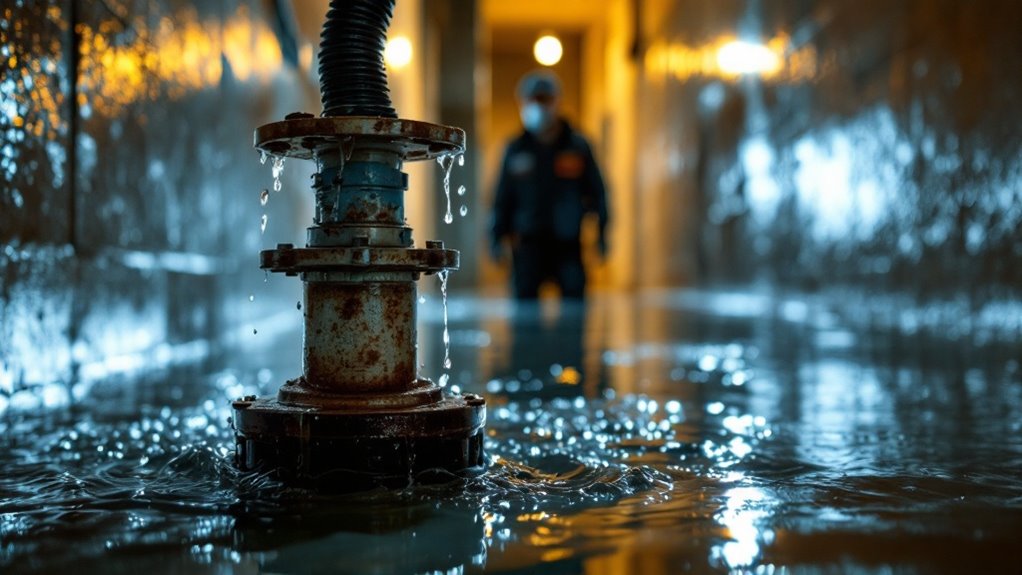
When heavy rainfall or rapid snowmelt occurs, a functioning sump pump is vital for protecting your basement from flooding. To guarantee your home stays dry, proper sump pump maintenance is important. Regular checks can prevent failures that lead to costly damages. Here's a quick overview of what to take into account:
| Maintenance Task | Frequency | Importance |
|---|---|---|
| Inspect the pump | Monthly | Detect issues early |
| Test the float switch | Every 3 months | Make sure pump activates |
| Clean the sump basin | Annually | Remove debris and buildup |
| Check discharge line | Before storms | Prevent clogs and backups |
If you don't have a sump pump yet, think about professional sump pump installation to safeguard your basement from future emergencies.
Running Toilets: Common Causes and Fixes
If you've noticed the sound of running water in your bathroom, it could indicate a malfunctioning toilet that needs immediate attention. Common causes include:
- Worn Toilet Flapper: Over time, the toilet flapper can degrade, leading to constant water flow. Replacing it is often a quick and effective fix.
- Incorrect Water Level: If the water level in the tank is too high, it can cause the overflow tube to spill. Adjust the float arm to set the correct height.
- Faulty Fill Valve: A malfunctioning fill valve may not close properly, allowing water to continue running. Replacing this component guarantees a proper seal.
Pipe Corrosion: Prevention and Repair Options
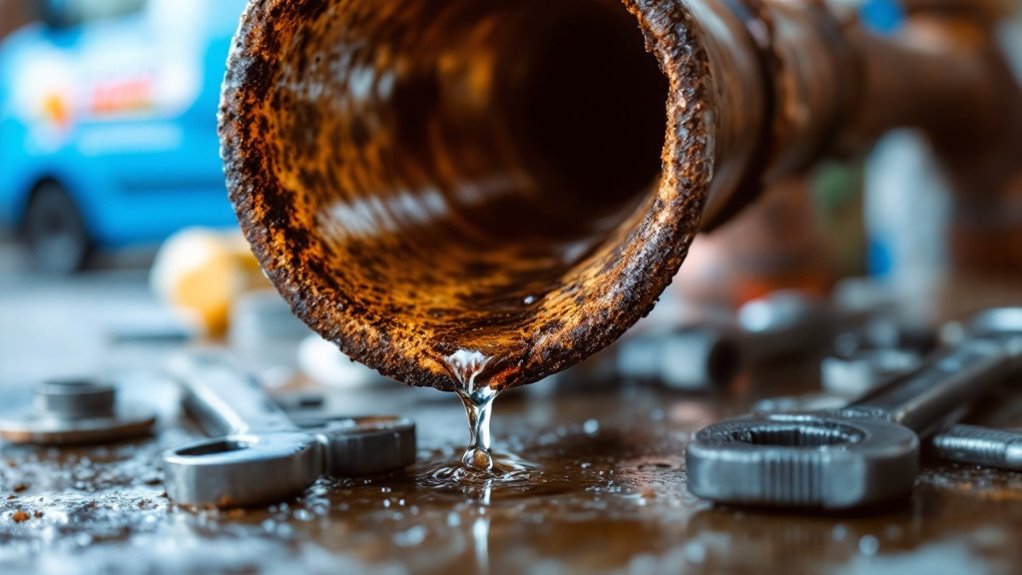
Although pipe corrosion often develops gradually, its effects can lead to considerable plumbing emergencies if not addressed promptly. Regular pipe inspections are vital for identifying corrosion early. You should consider corrosion inhibitors as part of your water treatment process, which can greatly improve rust prevention. Establishing maintenance schedules guarantees you stay on top of potential issues. When planning plumbing upgrades, prioritize material selection to choose corrosion-resistant options that suit your water quality. Don't hesitate to seek professional assessments, as they can provide tailored solutions for your specific situation. By taking these proactive steps, you can effectively manage pipe corrosion and avoid costly repairs down the line, making sure your plumbing system remains functional and efficient.
Frequently Asked Questions
How Can I Prevent Plumbing Emergencies in My Home?
To prevent plumbing emergencies, you should schedule regular inspections and perform preventative maintenance on your pipes and fixtures. This proactive approach helps you identify issues early, saving you from costly repairs and unexpected disruptions.
What Are the Signs of a Plumbing Emergency?
When you're facing a little water drama, keep an eye out for broken pipes or leaking fixtures. Those telltale signs—bubbling walls, strange noises, or sudden puddles—could indicate a plumbing emergency needing immediate attention.
How Do I Choose a Reliable Plumber in Morrow?
To choose a reliable plumber in Morrow, read plumber reviews and check for emergency services. Verify they're licensed and insured, and ask for references. Trust your instincts—it's vital for your peace of mind during emergencies.
What Should I Do if I Have a Plumbing Emergency at Night?
If you face nighttime plumbing issues, first shut off the water supply to prevent damage. Then, gather emergency tips like using a bucket for leaks and contacting a reliable plumber as soon as possible.
Are Plumbing Emergencies Covered by Homeowners Insurance?
When plumbing troubles strike like a thief in the night, your home insurance may offer a lifeline. Check your policy for plumbing coverage, as it often varies based on the cause—unexpected leaks might be included.
